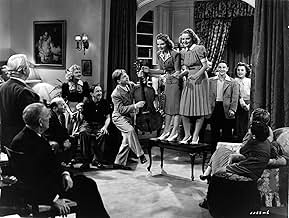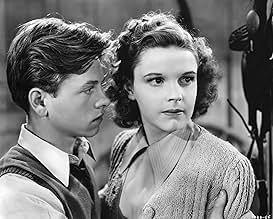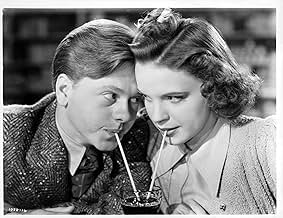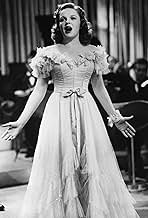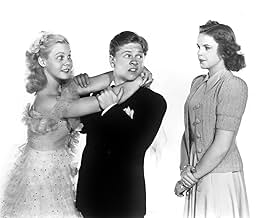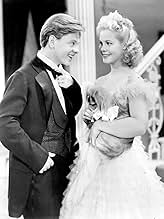A group of vaudevillians struggling to compete with talkies hits the road hoping for a comeback. Frustrated to be left behind, all of their kids put on a show themselves to raise money for t... Read allA group of vaudevillians struggling to compete with talkies hits the road hoping for a comeback. Frustrated to be left behind, all of their kids put on a show themselves to raise money for the families and to prove they've got talent, too.A group of vaudevillians struggling to compete with talkies hits the road hoping for a comeback. Frustrated to be left behind, all of their kids put on a show themselves to raise money for the families and to prove they've got talent, too.
- Nominated for 2 Oscars
- 2 wins & 2 nominations total
- Bobs
- (as John Sheffield)
Featured reviews
Most of the songs are nice but none wowed me. Several classic Rodgers & Hart tunes from the Broadway musical this was based on are either omitted altogether or featured too briefly to make an impact. An ear-splitting operatic version of "You're My Lucky Star" by Betty Jaynes is probably the worst song in the movie. Judy's "I Cried for You" is best. Salute to minstrel shows with cast members in blackface will upset some so prepare yourself if you're one of them. Directed by Busby Berkeley, as evidenced by his distinct touches on the "God's Country" closing number. Speaking of which, that number has Mickey & Judy satirizing FDR & Eleanor. After FDR's death this part was cut out of future showings and it remained that way until the '90s. It's a lively number and the added historical value is a plus. Good old-fashioned fun. Charming, innocent, and yes, a little corny, but an enjoyable movie overall.
On the other hand, is it really possible that the manic Mickey Rooney was only 19 when he made this? He really shows why he may be the single most talented American performer of the last century. He dances, he sings, he does drama, he does comedy, and he has incredible control over his every move and muscle. And he does unbelievable and hilarious impressions of Clark Gable and Lionel Barrymore. And Franklin Roosevelt.
A few quick notes: June Priesser, who plays "Baby" Rosalie, was a terrible actress. But watch out for her stomach-churning contortionist back-rolls when she first comes out on a stage.
The child actor who plays Mickey Rooney at age 5 dancing on a Vaudeville stage for a few moments early on really does look like Mickey Rooney!
I think Judy Garland actually has some of the same lines in this movie as she does in "Wizard of Oz", done in this same year. Watch out for when Mickey Rooney feints early in the film; Garland reacts to this exactly, and I mean exactly, as she does in Oz when the Lion feints. Eerie!
When Judy Garland, as Eleanor Roosevelt, sings "My day, my day", she is referring to an actual long-running newspaper column written by E.R. from 1936 to 1962.
Finally, the final song and dance number is the most mind-numbing, over-the-top tribute to America, dancing, how we are not Nazis, American Indians, Asian Indians, dancing, the Roosevelts, and dancing, that I have ever seen. Yes, it was early WWII, but still, you wonder if anyone even in 1939 thought this was a little too much?
Recommended for its high energy, its Rooney and Garland, its more Rooney, its offensiveness, and its too much of everything. It is history, and should be watched by all.
BABES IN ARMS was originally a Rogers and Hart show that proved a smash on the New York stage--a slightly satirical script with one of the most powerful scores of the 1930s. MGM specifically purchased the property for Rooney and Garland and then promptly threw out the script, most of the score, and transformed the thing into the tale of young teenagers who decide to put on a show in a barn.
Although well performed, the songs that replaced the original score simply do not measure up to the play's original score, and viewers are likely to be startled by a minstrel show number that finds Mickey and Judy romping in blackface. In justice to the film, it should be remembered that while minstrel shows remained popular well into the 1950s, and such great stars as Al Jolson and Eddie Cantor performed in full blackface well into the 1930s. While the number is stereotypical, it is not meanspirited, and if nothing else it offers a glimpse into a now dead theatrical tradition.
But weirdest of all is the grand finale "In God's Country," a strange mixture of Hollywood ballyhoo, patriotism, and fear of the European war that would soon engulf the world. In its original form, the number also included Rooney and Garland doing a take off of FDR and Eleanor; although cleverly performed and quite mild in content, this was later cut in re-release, for MGM worried it might be construed as disrespectful during wartime.
The film has a number of distinct flaws. Director Busby Berkley was most at home with big-budget musicals that had scope for the elaborate dance numbers he favored--he's something of a fish out of water with this more intimate material, and his approach feels heavy handed. Although much admired at the time (he actually received an Academy Award nomination for Best Actor for this film), Mickey Rooney's performance is absurdly manic by modern standards, and Garland's more natural performance is too often overshadowed by his excesses. The script is as weak as the score, few of the supporting performers are memorable (Margaret Hamilton is an exception), and the whole thing has a awkward quality to it.
Even so, it's still possible to see what all the fuss was about. The film does capture an inkling of the famous Rooney-Garland chemistry--a chemistry that would fuel three more "let's put on a show!" musicals, each one more more effective than the last. It is there in every musical number the two perform, in every line, in every scene, a very real and very powerful thing. While casual viewers would do better to select either BABES ON Broadway or GIRL CRAZY, in spite of all its flaws, Rooney-Garland fans will likely find BABES IN ARMS an essential.
Gary F. Taylor, aka GFT, Amazon Reviewer
What he and Judy do, they do better than anyone else, put on a show. In fact in this case the 'put on a show' gambit did originate in the original Broadway Musical. Babes in Arms was one of Richard Rodgers and Lorenz Hart's best shows it ran for 289 performances in the 1937 season and boasted such Rodgers&Hart classics as Johnny One Note, Way Out West, My Funny Valentine, I Wish I Were in Love Again all of which were discarded for the film. The Lady is a Tramp is only heard instrumentally, my guess is the Code frowned on that lyric. The title song and Where or When are retained. In fact when you come right down to it, only the basic idea the songs mentioned and a couple characters names came over from Broadway.
Still Nacio Herb Brown and Arthur Freed wrote Good Morning which is better known from Singin' in the Rain, but it was Judy and Mickey who introduced it here. And a whole lot of other Brown&Freed songs from MGM musicals got interpolated into the score.
Douglas MacPhail and Betty Jaynes who were introduced in Sweethearts also are here and sing beautifully. They married, but the marriage and MacPhail's career fell apart and he committed suicide a few years later. He had a great baritone voice, what a shame. The following year he introduced my favorite Cole Porter song, I Concentrate On You in The Broadway Melody of 1940.
This was the film Judy Garland did right after The Wizard of Oz and coming along right with her is Margaret Hamilton playing another Miss Gulch like character. One of those spinster ladies who forever pry into other people's business.
Believe it or not there was still a lot of prejudice against theatrical people even in 1937. A lot of old vaudeville types like Charles Winninger, Rooney's father in the film, settle in the town of Seaport on Long Island and their presence apparently upsets the ruling families like Hamilton's. When times go bad and vaudeville goes to seed, things get kind of rough for them. The old timers try to take a last tour to raise some money, but instead it's the kids who are up to the latest trends in pop music who save the day.
Guy Kibbee is in this also, playing against type as a wise and sympathetic judge, usually the parts MGM reserved for Lewis Stone or Lionel Barrymore. A more typical Kibbee type would be the oafish tycoon in 42nd Street, but he's fine here.
Possibly director Busby Berkeley wanted Kibbee, maybe as a good luck charm from that other breakthrough musical of his from his days at Warner Brothers. Of course the musical numbers in the show are set with the usual Berkeley surrealism, a little tempered though from his high flying days at Warner Brothers. That same year Berkeley had done a surreal type number in the Jeanette MacDonald-Lew Ayres film Broadway Serenade and it laid an egg. Someone at MGM must have reined him in.
Babes In Arms retains all its charms from 1939 mainly because Mickey Rooney is infectious and Judy Garland's singing is eternal.
Did you know
- TriviaMGM Studio's biggest money grosser of 1939, surpassing Le Magicien d'Oz (1939) for that production year.
- GoofsDuring the girls' duet, Patsy Barton begins her solo, and Mickey Moran switches from cello plucking to piano thumping. However, the music continues as it was before, and we don't hear any amazing sounds on the piano in spite of Mickey's efforts.
- Quotes
Rosalie Essex: How much do you need?
Mickey Moran: Well, let me see. First of all, we're going to use a barn that some actors used last summer and turned it into an outdoor theater. I figured if we all pitched in together - that is, for the scenery and the costumes and everything - it would run us about $287.
Rosalie Essex: Have you got it yet?
Mickey Moran: No.
Rosalie Essex: Well, you have now.
- Alternate versionsOlder TV prints (and early video releases) of "Babes In Arms" run 91 minutes, and exclude the "My Day" segment of the finale, with Mickey Rooney and Judy Garland spoofing Franklin and Eleanor Roosevelt. This segment was deleted for a 1948 reissue. "My Day" was restored in the 1990's by Ted Turner, and is included in current prints.
- ConnectionsEdited into Hollywood: The Dream Factory (1972)
- SoundtracksBabes in Arms
(1937)
Music by Richard Rodgers
Lyrics by Lorenz Hart
Played during the opening credits
Sung by Douglas McPhail (uncredited), Mickey Rooney (uncredited), Judy Garland (uncredited) and chorus
- How long is Babes in Arms?Powered by Alexa
Details
- Release date
- Country of origin
- Language
- Also known as
- Los hijos de la farándula
- Filming locations
- Production company
- See more company credits at IMDbPro
Box office
- Budget
- $748,000 (estimated)
- Runtime1 hour 34 minutes
- Color
- Aspect ratio
- 1.37 : 1
Contribute to this page



